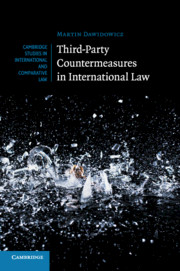Book contents
- Frontmatter
- Contents
- Foreword
- Preface
- Table of Cases
- List of Abbreviations
- 1 Introduction
- 2 Third-Party Countermeasures and the ICJ
- 3 Third-Party Countermeasures in the ILC
- 4 Third-Party Countermeasures in State Practice
- 5 Permissibility of Third-Party Countermeasures: Evaluation
- 6 Third-Party Countermeasures and Safeguards against Abuse
- Conclusion
- Bibliography
- Index
- Miscellaneous Endmatter
Foreword
Published online by Cambridge University Press: 01 June 2017
- Frontmatter
- Contents
- Foreword
- Preface
- Table of Cases
- List of Abbreviations
- 1 Introduction
- 2 Third-Party Countermeasures and the ICJ
- 3 Third-Party Countermeasures in the ILC
- 4 Third-Party Countermeasures in State Practice
- 5 Permissibility of Third-Party Countermeasures: Evaluation
- 6 Third-Party Countermeasures and Safeguards against Abuse
- Conclusion
- Bibliography
- Index
- Miscellaneous Endmatter
Summary
In this study, Martin Dawidowicz examines one of the great, unresolved questions of current international law: the position of third-party countermeasures. The topic is a difficult and controversial one. The construction of a multilateral public order is based not so much on logic as some mixture of high hope and limited experience. The construction may rest on the imposing pseudo-Roman columns of jus cogens and obligations erga omnes – les grandes verticales – but these were largely based on assertion rather than actual performance. It seems that this ambitious construction may have reversed the Roman scheme that it is society that requires and generates the law: ubi societas, ibi jus. Nowadays it may seem that international law seeks to develop more rapidly than international society may allow, including in the field of communitarian law enforcement. However, as this study shows, the position is not quite so bleak – the present state of play embodies hope, no doubt, but also a deal of experience.
For the use of otherwise unlawful unilateral sanctions of a peaceful character taken in defence of communitarian norms – i.e. third-party countermeasures – is an increasingly common phenomenon in international relations. They are often resorted to by a large (and increasingly diverse) number of States acting in concert as part of a broader strategy to deal with major assaults on multilateral public order. There is much here that requires careful, thorough and sober analysis. Martin Dawidowicz provides all this.
This is – remarkably – the first study on third-party countermeasures in international law which addresses the topic in a systematic and comprehensive way, based on the turbulent and even occasionally idiosyncratic development of ideas on countermeasures in the International Law Commission, resulting in the compromise ‘solution’ found in Article 54 ARSIWA. Both sides of the argument in this fraught debate are given due consideration. The study rightly places emphasis on the greatest area of uncertainty – State practice – which has received too little attention. This approach has yielded a substantial harvest which is presented for the reader's consumption in a lucid, thoughtful and convincing manner. It makes a significant contribution to our understanding of the position of third-party countermeasures in international law. In doing so, it successfully challenges some widely held assumptions about the likely impact of a regime of third-party countermeasures on international relations.
- Type
- Chapter
- Information
- Third-Party Countermeasures in International Law , pp. ix - xPublisher: Cambridge University PressPrint publication year: 2017

